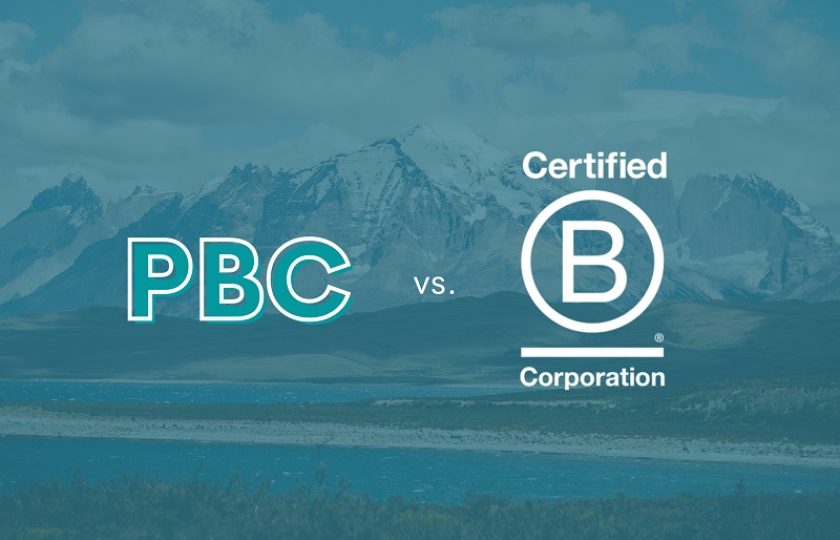Whether your business is a socially committed startup or a grandfather corporation who has recently committed to prioritizing a social impact program, you may start questioning the different entity options and which is best for your company moving forward. One question that gets asked a lot is what is the difference between a PBC (Public Benefit Corporation) and a B corp and what is the benefit of each? Let’s break it down.
What are Some Difference Between PBC and B Corp?
A Public Benefit Corporation, also known as a PBC, is a for-profit company that does seek a profit but still wants to have a public, legally binding commitment to some social or environmental benefits. Stockholders often look for companies that make sustainability or good environmental performance a common practice. Because a PBC is not only required to measure its social/environmental performance but share that in its annual report to shareholders, it has some added social responsibility that you can’t find in ordinary companies.
What is a B Corp?
B Corp receives third-party evaluation to check on its dedication to social and environmental responsibility. However, this doesn’t come with a legal obligation to update shareholders regularly—nor does it infer any social commitments going into the future. B corp is not an entity type that you would file by (like PBC, s corp or c corp), but a certification that is issued by the nonprofit called B Lab.
Essentially, a PBC has legal obligations to retain a commitment to positive social or environmental impact. In contrast, a B Corp status has a passing grade for a company—which may be subject to change. Depending on the circumstances, you’ll likely feel optimistic about working with a for-profit corporation with B Corp status, as it has had its commitment to a specific public benefit evaluated by a third party.
What is an example of a Public Benefit Corporation?
Corporations with specific public benefit reasons behind their incorporation can typically receive PBC status. For instance, a public library or hospital system might go beyond becoming a certified B Corp and a full PBC. These organizations can work like any other type of corporation—having a board of directors, being subject to corporation law, and even being the work of entrepreneurs. The difference between a PBC and a regular for-profit corporation is the PBC has legal requirements for making social commitments and reporting them to shareholders.
What is an example of a B Corp Company?
A B Corp Company can be just about any company, including S corporations and C corporations, which has had its commitment to social impact evaluated by a third party (a nonprofit called B Lab). One example of a B Corp Company is Patagonia, which regularly passes B Corp assessments in its commitment to doing better than traditional corporations without this commitment.
We should reiterate Patagonia’s assessment as a B Corp doesn’t carry legally-binding obligations. But it does mean that if you work with Patagonia, you can have some confidence that its business model is friendly toward environmental impact and shareholder value.
The B Corp as a business model might seem informal, but you can look at it as a type of certification, with the goal in mind being a specific public benefit purpose. Shareholder value is still important under a B Corp, but they’ve taken on some added responsibilities when evaluating their commitment to strong social and environmental practices.
Who Has to File a Benefit Report?
A B Corp company may not have to file a specific benefit report. Still, it does have to undergo a rigorous certification process to ensure the company is upholding its commitment to retain B Corp status that is reevaluated every 2 years. A PBC, on the other hand, doesn’t have the same B Corp certification process—but it does have the legal obligation to update its shareholders on its status.
Both companies still have a fiduciary responsibility to watch out for shareholder value. However, those companies that have taken the B Impact Assessment are also demonstrating their ability to uphold social and environmental values, even if they don’t have the legal commitment that a PBC does.
What is “B Lab”?
In searching for keywords like “certificate of incorporation” or which corporations are committed to positive social and environmental impacts, you might come across the phrase “B Lab.” This refers to the nonprofit corporation B Lab, which provides certifications to corporations who want to demonstrate their adequate social and environmental performance, despite being for-profit companies.
What does it take to earn a “B Lab” certification? There are a few variables that need to be met:
- The company must have been in existence for at least 12 months, giving a long-enough time range to demonstrate its commitment to these values.
- Although large companies are included, typically, those companies with over $100 million in revenue have stricter standards enforced on them, including a certification process that is more involved.
- Some companies in so-called “controversial industries,” such as bottled water companies, can have a more challenging time earning B Lab certification.
- The B-Impact assessment includes 80 specific points, including a review and evaluation process.
- Certification is available in select states only.
In other words, it’s a lengthy and complicated process that companies undertake voluntarily. That means companies like Patagonia that have earned this certification in the past are demonstrating that they’re certified and willing to go through this rigorous process to show their stakeholders and customers that it’s committed to social and environmental causes.
Wondering if you qualify? Check out B Lab’s free assessment here: https://www.bcorporation.net/en-us/programs-and-tools/b-impact-assessment/
Why Worry About PBC or B Corp Status?
While donating money to nonprofits and setting up volunteer events is always moving the needle forward, identifying as a PBC and/or B Corp is a next step for commitment. Here are some benefits you can expect out of a B Corp certification:
- Dedication to the mission becomes more long term
- Attract people (and suppliers) who’s passions are aligned
- Continue to be held accountable
- Protect your mission and legacy
- Build relationships
You can also improve employee engagement by committing yourself to work with other companies that meet these rigorous standards—giving everyone at your company a sense of confidence that you believe in making positive changes to the world around you.
Whether a company organizes as a PBC or B Corp (or both), they are making a strong statement about their commitment to people and the planet by using their business as a force for good.
Not a B Corp or PBC? Other great ways to make an impact:
- Start a social impact program
- Set up a donation match for your employees
- Get your team out in the community to volunteer
- Set up a grant program to donate to nonprofits
- Run a Giving Madness bracket
- Forgo swag and send charitable gift cards instead!



